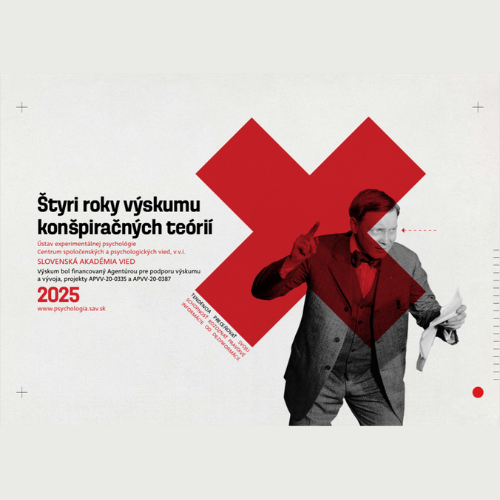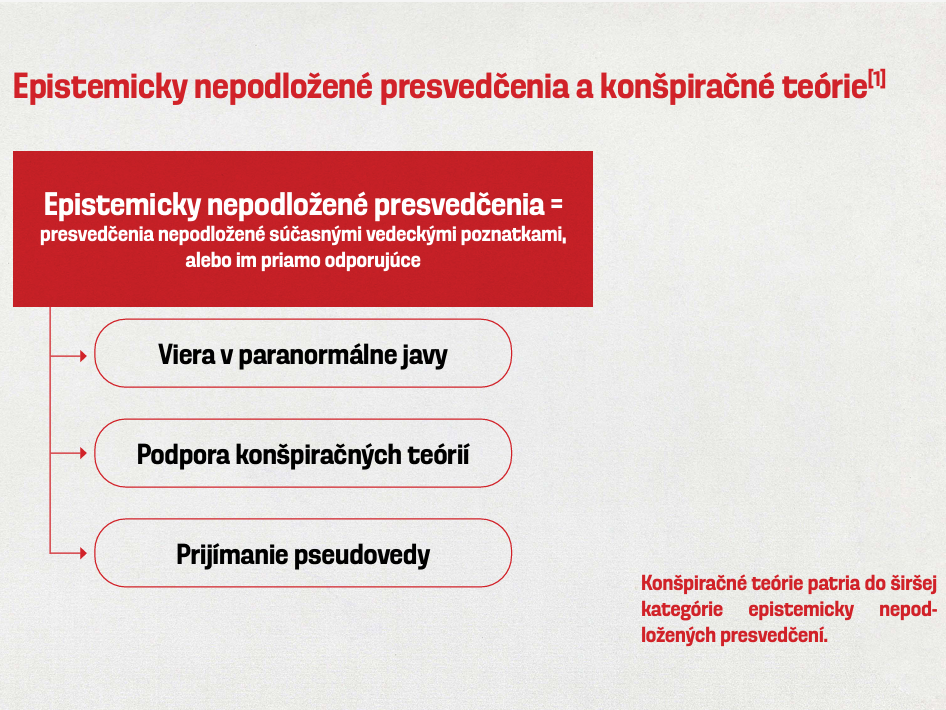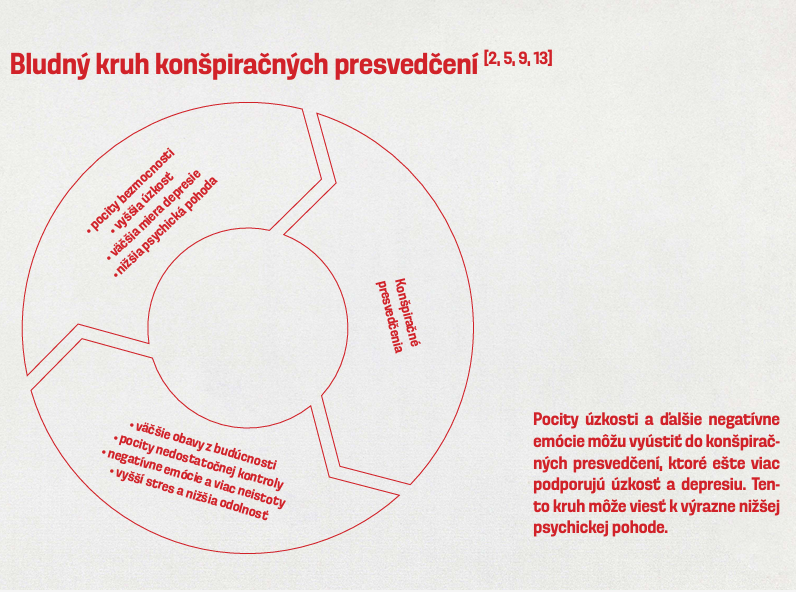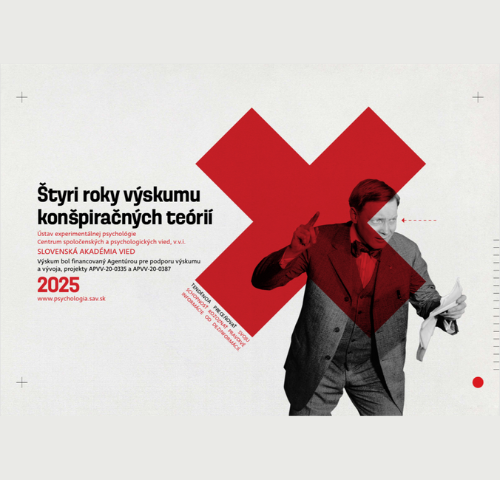Nová brožúra sumarizuje 4 roky psychologického výskumu konšpiračných teórií a dezinformácií

V júni 2025 končili na našom ústave dva veľké projekty APVV (APVV-20-0335 a APVV-20-0387), ktoré sa venovali psychologickým a sociálnym príčinám epistemicky nepodložených presvedčení, najmä konšpiračných teórií a dezinformácií. Projekty boli riešené od roku 2021 a oba reagovali na rastúci výskyt nepodložených presvedčení a s nimi súvisiacich negatívnych javov počas pandémie COVID-19 a vojny na Ukrajine. Výskum priniesol dôležité poznatky o mechanizmoch, ktoré stoja za vznikom a šírením nepodložených presvedčení, a o tom, ako ich ovplyvňujú kognitívne skreslenia, negatívne emócie aj spoločenské podmienky. Jedným z výstupov oboch projektov je voľne dostupná brožúra, ktorá sumarizuje ich zistenia.
Prvý projekt („Psychologické súvislosti nepodložených informácií a presvedčení súvisiacich s pandémiou COVID-19“) sa zameriaval na dlhodobé psychologické a spoločenské dôsledky pandémie COVID-19, najmä na to, ako prispela k šíreniu konšpiračných presvedčení, strate dôvery v inštitúcie a maladaptívnemu správaniu. V rámci neho bol realizovaný trojvlnový longitudinálny zber dát, ktorý umožnil sledovať, ako sa menia nepodložené presvedčenia v čase a určiť tiež časovú následnosť možných príčin a následkov. Medzi najväčšie prínosy patria výsledky týkajúce sa identifikovania dlhodobých negatívnych spoločenských dôsledkov konšpiračných teórií. Napríklad sa ukázalo, že ľudia podliehajúci konšpiráciám sú aj menej spokojní so svojou životnou úrovňou, obávajú sa o svoju finančnú situáciu, očakávajú skôr finančné problémy v budúcnosti, no zároveň sú menej ochotní spraviť kroky ku stabilizácii svojej finančnej situácie. Pocity bezmocnosti a distresu súvisia s vyššou náchylnosťou prijímať konšpiračné a pseudovedecké presvedčenia, no zároveň sa vo výskume[1] preukázalo, že konšpiračné a pseudovedecké presvedčenia tieto negatívne pocity v čase umocňujú a ich efekt na prehlbovanie bezmocnosti a psychologického distresu je silnejší, než v opačnom smere. Ich celkový vzťah však možno považovať za obojsmerný, čo naznačuje ich vzájomné posilňovanie.
Podobný obojsmerný vzťah a vzájomné posilňovanie dôvery v konšpiračné presvedčenia a nedôvery voči inštitúciám a odborníkom sa ukázal aj v ďalšej štúdii[2]. Zaujímavosťou je, že kým v prípade dôvery vo vládu boli vzťahy obojstranné, v prípade poklesu dôvery v odborníkov (vedcov a lekárov) sa viac prejavil negatívny efekt šírenia konšpiračných a pseudovedeckých presvedčení. Tieto zistenia poukazujú na to, že nepodložené presvedčenia môžu oslabovať dôveru v kľúčové inštitúcie, čo má závažné dôsledky a to najmä v obdobiach zdravotných a spoločenských kríz.
Projekt sa zameriaval aj na dlhodobé súvislosti dôvery konšpiračným presvedčeniam s ekonomickou úzkosťou. V sérii dvoch výskumov[3] sa zistilo, že konšpiračné presvedčenia v rôznych kultúrnych kontextoch súvisia s vyššou ekonomickou úzkosťou. Longitudinálne analýzy potvrdili, že sú to práve konšpiračné presvedčenia, ktoré zvyšujú pocit ekonomickej úzkosti, a nie naopak.
Prvý projekt („Psychologické súvislosti nepodložených informácií a presvedčení súvisiacich s pandémiou COVID-19“) sa zameriaval na dlhodobé psychologické a spoločenské dôsledky pandémie COVID-19, najmä na to, ako prispela k šíreniu konšpiračných presvedčení, strate dôvery v inštitúcie a maladaptívnemu správaniu. V rámci neho bol realizovaný trojvlnový longitudinálny zber dát, ktorý umožnil sledovať, ako sa menia nepodložené presvedčenia v čase a určiť tiež časovú následnosť možných príčin a následkov. Medzi najväčšie prínosy patria výsledky týkajúce sa identifikovania dlhodobých negatívnych spoločenských dôsledkov konšpiračných teórií. Napríklad sa ukázalo, že ľudia podliehajúci konšpiráciám sú aj menej spokojní so svojou životnou úrovňou, obávajú sa o svoju finančnú situáciu, očakávajú skôr finančné problémy v budúcnosti, no zároveň sú menej ochotní spraviť kroky ku stabilizácii svojej finančnej situácie. Pocity bezmocnosti a distresu súvisia s vyššou náchylnosťou prijímať konšpiračné a pseudovedecké presvedčenia, no zároveň sa vo výskume[1] preukázalo, že konšpiračné a pseudovedecké presvedčenia tieto negatívne pocity v čase umocňujú a ich efekt na prehlbovanie bezmocnosti a psychologického distresu je silnejší, než v opačnom smere. Ich celkový vzťah však možno považovať za obojsmerný, čo naznačuje ich vzájomné posilňovanie.
Podobný obojsmerný vzťah a vzájomné posilňovanie dôvery v konšpiračné presvedčenia a nedôvery voči inštitúciám a odborníkom sa ukázal aj v ďalšej štúdii[2]. Zaujímavosťou je, že kým v prípade dôvery vo vládu boli vzťahy obojstranné, v prípade poklesu dôvery v odborníkov (vedcov a lekárov) sa viac prejavil negatívny efekt šírenia konšpiračných a pseudovedeckých presvedčení. Tieto zistenia poukazujú na to, že nepodložené presvedčenia môžu oslabovať dôveru v kľúčové inštitúcie, čo má závažné dôsledky a to najmä v obdobiach zdravotných a spoločenských kríz.
Projekt sa zameriaval aj na dlhodobé súvislosti dôvery konšpiračným presvedčeniam s ekonomickou úzkosťou. V sérii dvoch výskumov[3] sa zistilo, že konšpiračné presvedčenia v rôznych kultúrnych kontextoch súvisia s vyššou ekonomickou úzkosťou. Longitudinálne analýzy potvrdili, že sú to práve konšpiračné presvedčenia, ktoré zvyšujú pocit ekonomickej úzkosti, a nie naopak.
Druhý projekt ("Redukovanie šírenia dezinformácií a nepodložených presvedčení") sa viac zameriaval na kognitívne, osobnostné a sociálne faktory, ktoré prispievajú k prijímaniu a šíreniu dezinformácií a nepodložených presvedčení. Otestovali sa tiež účinnosti rôznych stratégií boja proti dezinformáciám. Dve štúdie[4;5] ukázali, že anti-konšpiračné argumenty môžu znížiť konšpiračné presvedčenia a nenormatívne politické správanie aj u ľudí s pevne zakorenenými názormi, hoci pri témach ako očkovanie zostáva ich vplyv na postoje obmedzený. Tieto výsledky naznačujú, že vyvracanie môže mať obmedzený efekt pri dlhodobo udržiavaných nepodložených presvedčeniach a že hodnotenie účinnosti intervencií v kontroverzných témach, ako je očkovanie, si vyžaduje ďalší výskum.
Skúmaná bola aj účinnosť korektívnych správ obsahujúcich faktické informácie pri vyvracaní dezinformácií[6] a porovnávalo sa, ako účinnosť ovplyvní načasovanie korektívneho zásahu – pred vystavením dezinformácii (prebunking) alebo až po vystavení dezinformácii (debunking). Debunking (vyvracanie po vystaveniu dezinformácii) významne znížil dôveru v dezinformačné tvrdenia a tento účinok pretrvával minimálne niekoľko týždňov. Prebunking (zásah pred vystavením dezinformácii) bol účinný iba počas veľmi krátkeho časového obdobia, alebo ak sa aplikoval tesne pred expozíciou dezinformáciám.
Výsledky oboch projektov prinášajú nové poznatky o bludnom kruhu konšpiračných presvedčení, nedôvery a emočného distresu, pričom poukazujú na súhru kognitívnych skreslení, negatívnych emócií (ako úzkosť či bezmocnosť) a širších spoločenských faktorov, ako sú ekonomická prekarita alebo politická polarizácia. Zistenia majú nielen teoretický význam, ale aj praktickú hodnotu v podobe odporúčaní, ako efektívne obmedziť šírenie dezinformácií a zvýšiť odolnosť spoločnosti prostredníctvom cielenej komunikácie a vzdelávania.
Skúmaná bola aj účinnosť korektívnych správ obsahujúcich faktické informácie pri vyvracaní dezinformácií[6] a porovnávalo sa, ako účinnosť ovplyvní načasovanie korektívneho zásahu – pred vystavením dezinformácii (prebunking) alebo až po vystavení dezinformácii (debunking). Debunking (vyvracanie po vystaveniu dezinformácii) významne znížil dôveru v dezinformačné tvrdenia a tento účinok pretrvával minimálne niekoľko týždňov. Prebunking (zásah pred vystavením dezinformácii) bol účinný iba počas veľmi krátkeho časového obdobia, alebo ak sa aplikoval tesne pred expozíciou dezinformáciám.
Výsledky oboch projektov prinášajú nové poznatky o bludnom kruhu konšpiračných presvedčení, nedôvery a emočného distresu, pričom poukazujú na súhru kognitívnych skreslení, negatívnych emócií (ako úzkosť či bezmocnosť) a širších spoločenských faktorov, ako sú ekonomická prekarita alebo politická polarizácia. Zistenia majú nielen teoretický význam, ale aj praktickú hodnotu v podobe odporúčaní, ako efektívne obmedziť šírenie dezinformácií a zvýšiť odolnosť spoločnosti prostredníctvom cielenej komunikácie a vzdelávania.


Z výskumov vyplynuli aj tieto praktické odporúčania uplatniteľné v každodennom živote:
• Buďme ostražití voči svojej vlastnej prehnanej istote. Náš výskum ukázal, že väčšina ľudí si myslí, že vie rozlíšiť pravdu od lži, no často sa mýlime a tí, čo sa preceňujú najviac, sú voči dezinformáciám najzraniteľnejší.• Vzdelávajme sa v oblasti mediálnej gramotnosti. Ukázali sme, že aj jednoduché tipy môžu zlepšiť schopnosť odhaliť falošné správy.
• Pri stretnutí s dezinformáciou, faktické vyvracanie (debunking) má väčší efekt na zníženie dôvery v dezinformáciu ako preventívne vyvracanie.
• Berme do úvahy, že ekonomická neistota a nízka dôvera v inštitúcie zvyšujú náchylnosť veriť konšpiráciám. Podpora dôvery v inštitúcie a zlepšovanie ekonomickej situácie môžu prispieť k obmedzeniu šírenia konšpiračných presvedčení.
• Neignorujme vlastné pocity úzkosti a bezmocnosti – môžu vás urobiť zraniteľnejšími voči dezinformáciám. Práca na psychickej odolnosti a zvládaní stresu je dôležitou prevenciou.
Stručné zhrnutie najvýznamnejších výsledkov aj odporúčaní oboch projektov nájdete v informačnej brožúre, ktorú si môžete stiahnuť v slovenskom aj anglickom jazyku.
Referencie:
[1] Ballová Mikušková, E., & Teličák, P. (2024). Unfounded beliefs, distress and powerlessness: A three‐wave longitudinal study. Applied Psychology: Health and Well‐Being, 16(4), 1539-1564.
[2] Merva, R., Šrol, J., & Čavojová, V. (2025). Institutional Distrust: Catalyst or Consequence of the Spread of Unfounded COVID-19 Beliefs?. Studia Psychologica, 67(1), 24-37
[3] Adamus, M., Chayinska, M., Šrol, J., Adam‐Troian, J., Ballová Mikušková, E., & Teličak, P. (2025). All you'll feel is doom and gloom: Multiple perspectives on the associations between economic anxiety and conspiracy beliefs. Political Psychology.
[4] Šrol, J., Čavojová, V., & Adamus, M. (2025). Dispelling the fog of conspiracy: Experimental manipulations, individual difference factors and the tendency to endorse conspiracy explanations. Thinking & Reasoning, 1–32. https://doi.org/10.1080/13546783.2025.2464962
[5] Adamus, M., Ballová Mikušková, E., & Kohut, M. (2024). Conspire to one's own detriment: Strengthening HPV Program Support Through Debunking Epistemically Suspect Beliefs. Applied psychology. Health and well-being, 16(4), 1886–1904.
[6] Lorko, M., Čavojová, V., Šrol, J., Priesol, R., Jalakšová, P., & Tužilová, B. (n.d.). Timing matters: Three-study test of the effects of debunking vs. prebunking on trust in disinformation.
Views: 821

